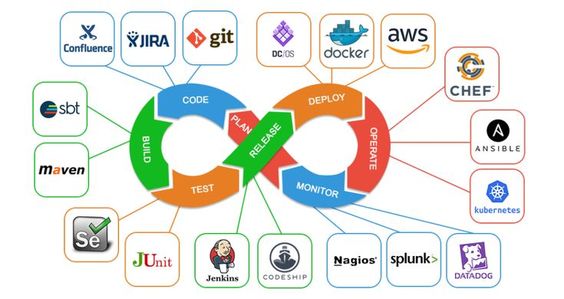Programming Fundamentals
DevOps is a rapidly growing field that combines software development and IT operations to streamline the software development lifecycle. DevOps practices aim to automate the delivery pipeline, increase collaboration between teams, and improve the speed and reliability of software delivery. As more organizations adopt DevOps, there is an increasing demand for skilled DevOps engineers who can design and implement DevOps solutions.
Programming fundamentals are the basic building blocks of software development. They include programming concepts, data structures, algorithms, and object-oriented programming.
Programming Concepts: Programming concepts are the fundamental ideas that guide software development. They include concepts like variables, data types, functions, control structures, and loops. Understanding these concepts is essential for writing effective code and building software applications.
We recommend the following FREE courses:
Why we chose C and Java?
If you’re planning to become a software engineer, It’s best to use C (including C# and C++) or Java. Yes you can learn programming in different languages. But these allow you to learn the programming fundamentals. In your professional career, you might not work with these languages. But the thing is, during the process of learning, you will learn different Programming Languages along the way. As mentioned, these provide a very good step that will help you build important fundamentals
Data Structures: Data structures are ways of organizing and storing data. They include arrays, linked lists, stacks, queues, trees, and graphs. Understanding data structures is important because they can help you efficiently manage large amounts of data and perform complex operations.
We recommend the following FREE courses:
-
Data Structures
-
C++ Data Structures in the STL
-
Data Structures and Design Patterns for Game Developers
Algorithms: Algorithms are a set of instructions that solve a particular problem or perform a specific task. They include search algorithms, sorting algorithms, graph algorithms, and many others. Understanding algorithms is important because it can help you solve problems efficiently and optimize your code.
We recommend the following FREE courses:
-
Algorithms for Searching, Sorting, and Indexing
-
Greedy Algorithms, Minimum Spanning Trees, and Dynamic Programming
-
Analysis of Algorithms
-
Advanced Algorithms and Complexity
Object-Oriented Programming: Object-oriented programming (OOP) is a programming paradigm that emphasizes the use of objects to model real-world concepts. OOP includes concepts like classes, objects, encapsulation, inheritance, and polymorphism. Understanding OOP is important because it allows you to write more modular, reusable, and maintainable code.
:We Recommend the following FREE courses
-
Object-Oriented Programming Concepts
-
Intermediate Object-Oriented Programming with Java
-
Introduction to Java and Object-Oriented
To learn programming fundamentals, you can start with an introductory programming course or tutorial in a language of your choice. Some popular languages for beginners include Python, Java, and Ruby. Once you have a basic understanding of programming concepts, you can start learning about data structures, algorithms, and object-oriented programming.
There are many online resources available to help you learn programming fundamentals, including online courses, tutorials, and books. It’s also important to practice writing code on your own to reinforce your understanding of programming concepts and build your coding skills. As you gain more experience, you can start exploring more advanced topics like software design patterns, multithreading, and network programming.
Git
If you are interested in becoming a DevOps engineer, there are several programming skills you need to learn. In this article, we will provide a roadmap to help you develop the necessary skills to become a proficient DevOps engineer.
We recommend the following FREE courses:
Configuration Management Tools
Before you start learning DevOps-specific tools and technologies, it’s important to have a solid understanding of programming fundamentals. You should be familiar with at least one programming language, such as Python, Java, or Ruby, and be comfortable with basic programming concepts like data structures, algorithms, and object-oriented programming.
We Recommend the following FREE courses:
Continuous Integration/Continuous Deployment (CI/CD) Tools
Git is a version control system that is widely used in the software development industry. DevOps engineers need to be proficient in Git because it’s used to manage code changes and ensure that changes are integrated into the software delivery pipeline smoothly. You should learn how to use Git commands to create and manage branches, merge changes, and resolve conflicts.
Cloud Computing
Configuration management tools are essential for DevOps engineers because they help automate the deployment of software and infrastructure changes. The two most popular configuration management tools are Chef and Puppet, but other tools like Ansible and SaltStack are also widely used. You should learn how to use these tools to define infrastructure as code, manage packages, and automate software deployments.
We Recommend the following FREE courses:
Monitoring and Logging Tools
CI/CD tools are used to automate the build, testing, and deployment of software changes. Popular CI/CD tools include Jenkins, Travis CI, and CircleCI. You should learn how to configure and use these tools to automate the software delivery pipeline, including setting up automated testing, building and packaging software, and deploying changes to production.
We Recommend the following FREE courses:
Security
Cloud computing is becoming increasingly popular in the software industry because it allows organizations to scale their infrastructure quickly and efficiently. DevOps engineers need to be familiar with cloud computing platforms like Amazon Web Services (AWS), Microsoft Azure, and Google Cloud Platform. You should learn how to deploy and manage applications in the cloud, including configuring virtual machines, creating storage, and using cloud-based databases.
Conclusion
Monitoring and logging tools are used to track the performance and health of software applications and infrastructure. Popular monitoring and logging tools include Nagios, Zabbix, and ELK Stack. You should learn how to configure and use these tools to monitor infrastructure performance, track errors, and troubleshoot issues.


